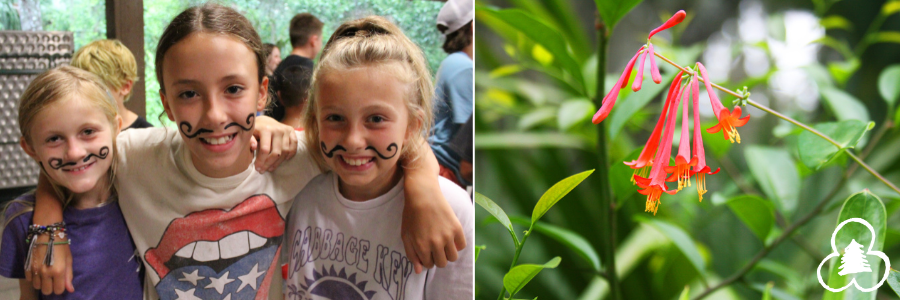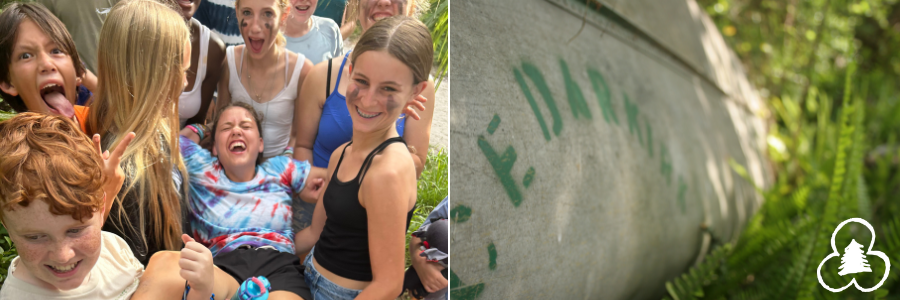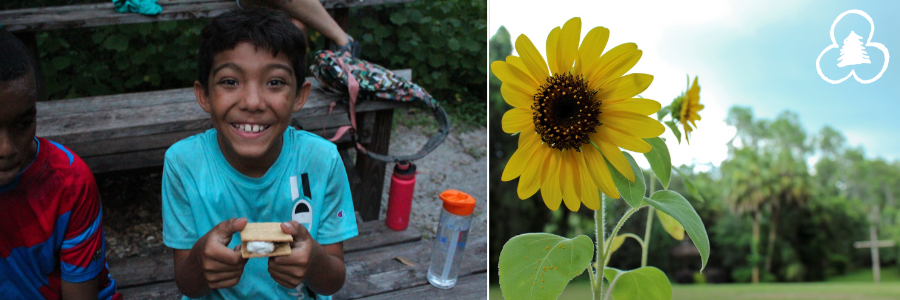
Parents’ Page
This page is intended to orient you to our summer camp programs and address many of the questions you may have regarding your child’s experience. Much of the information on this page is devoted to health and safety, the training and qualifications of the staff who will be living with and nurturing your child, and our policies. If you have a specific question, check out our Parent Handbook or head over to our Summer Camp FAQs page to search for answers to specific questions. As always, you are welcome to reach out to us directly (camps@cedarkirk.org; 813-685-4224 x2) with any questions you may have.
Summer Staff
We believe that a quality, well-trained staff is critical to a successful and safe camping experience. All of the transformation, all of the fun, all of the community-building that happens during a week of camp is due to the thoughtful intention these folks put into everything they do.
Screening: Residential summer staff members are enthusiastic young adults at least 18 years of age who have been interviewed, carefully selected, and trained extensively to ensure an exciting and meaningful camp experience for every camper. Prior to beginning work, summer staff undergo reference checks, a sex offender registry check, and a Florida Level 2 Fingerprint Screening (which encompasses a state criminal history record check through the Florida Department of Law Enforcement as well as a national criminal history record check).
Training: All summer staff participate in eleven days of intensive training before camp begins, with ongoing instruction and skill checks throughout the camp season. Training covers a diverse and exhaustive range of topics including: outdoor living skills; effective management of a small group and how to respond to the needs of individuals within that group; youth mental health training; safe facilitation of all of our activities; positive discipline techniques; recognizing and responding to homesickness; bullying prevention; and best practices for health and wellness. Staff also learn our summer Bible study curriculum, Cedarkirk’s policies, and more games than we could possibly list. They receive training in responding to emergencies and achieve certification in first aid, CPR, and the use of an AED. Training equips our staff with skills that enable them to create a physically and emotionally safe environment for all campers while emphasizing adventure, individuality, and spiritual growth.

Health & Safety
The health, safety, and well-being of your child is our first priority. Like any outdoor pursuit, camp programs are not without risk, but we aim to minimize risk and maximize fun through effective staff training, mandatory safety procedures, and quality supervision.
Safety: Safety starts with our team of staff, who are trained to be cognizant of outdoor hazards (flora, fauna, and weather), well-versed in the facilitation of all activities, and attentive to each camper. Summer staff are trained and certified in first aid, CPR, the use of an AED, and all of Cedarkirk’s emergency procedures. Safety at Cedarkirk also extends to each camper’s social and emotional welfare – we want them not just to be safe, but to feel safe. This means making sure each camper feels like an important part of their small group and the camp community, that their needs are met, and ensuring that any issues campers have are addressed quickly. Under the supervision of our staff, campers are given agency to help resolve any internal or interpersonal conflicts they have. (Read more about our Discipline Policy.)
Health: Cedarkirk has a first aid center in our main building, and a health officer is in residence at camp during each session. Emergency response facilities are located minutes from camp and a regional hospital is just over 10 miles away. All medications are locked in the first aid center and dispensed by the health officer (we do not permit campers or staff to keep medication with their belongings). Cedarkirk keeps over-the-counter medications and first aid items stocked in the first aid center, to be dispensed by the health officer as medically necessary: you do not need to send your child with these items.
Activity specialists: Cedarkirk’s high ropes challenge course is facilitated by an experienced staff member holding a certification in its safe operation. Pool use and all off-site water activities are monitored by certified lifeguards. Some Cedarkirk programs do involve off-site trips: campers participating in these trips will travel in insured Cedarkirk vehicles driven by directors or staff members over the age of 21 who have been cleared by our insurance company.
Our Supervision Policy
Cedarkirk campers are supervised at all times while under our care. From the moment a camper is signed in at the beginning of a camp session to the moment you sign them out at the end of the session, our supervision policy ensures their protection. Two primary rules drive our approach to camper supervision and safety.
“Sight and Sound”: For the duration of a camper’s time with us, they will be supervised continually, by either sight or sound. Counselors are instructed to maintain sight supervision of their campers at all times, except when it would be inappropriate to do so (e.g. while a camper is using the restroom or showering). During those exceptions, counselors must maintain sound supervision over their campers and be listening actively in case the camper has a problem or need. If a counselor needs to leave for any reason, another counselor or staff member must take over sight and sound supervision of a group of campers. This rule ensures that every child remains under staff care for the entirety of their camp experience.
“Rule of Three”: While at Cedarkirk, a camper will not be alone with a staff member or camper. Counselors bring along extra campers or staff members in any scenario where they might ordinarily find themselves with a single camper (e.g. walks from an activity to a restroom; trips to the healthcare manager). Besides ensuring the protection of each camper, this rule helps counselors be proactive in scheduling bathroom breaks, hydration stops, etc.

Our Discipline Policy
Philosophy: We work hard to maintain an environment of safety, inclusion, and fun. We want every camper to feel at home with us – like camp is a place where they can be their most genuine self. When a camper’s behavior threatens the environment we have created, staff work with the camper to evaluate their decisions and coach them toward better decisions in the future. Our goal is to resolve each issue or conflict in a healthy, positive way.
Practice: Each small group creates a covenant at the beginning of their session, which lays out expectations for life in the group and in the camp community. Campers and counselors have equal input in the covenant, and it is only signed and approved when everyone agrees on the final product. Staff and campers share responsibility in holding each other accountable to the covenant throughout their time at Cedarkirk.
Counselors use positive reinforcement and creative redirection to head off many discipline issues before they arise or escalate. Staff are trained in listening to campers to find out what is bothering them and what might be at the root of a particular decision or behavior. In most cases, the covenant, positive reinforcement, and frequent check-ins with individuals – and the group as a whole – are enough to keep things running smoothly.
Escalation: If speaking with a camper does not resolve an issue or encourage a change of behavior, a consequence may be given (with the consequence relating to the behavior that prompted it). If a camper continues to repeat the negative behavior, they may be asked to speak with the unit coordinator who heads their age group. (It is at this point that we generally reach out to a parent or guardian to see if they have any suggestions for working with the camper.) If that does not result in a positive change, the camper will be asked to speak with a director, and if a camper still chooses not to comply with the safe environment we have created, they will be sent home. It is our hope that we can intercede and work with a parent/guardian to resolve conflict in healthy ways before this drastic step is be taken. It is very rare for a camper to be sent home for discipline issues.
Absolutes: Violent behavior is never tolerated at Cedarkirk. Campers acting violently, or threatening violence, towards themselves or others are removed from their group and sent home. Staff never withhold food, snacks, or sleep as a consequence for a behavior; nor are they permitted to belittle or bully a camper who is acting out.
Faith Development
In addition to providing for the emotional and social growth of our campers, we also encourage them in their faith development. Cedarkirk is a faith-based camp affiliated with the Presbyterian Church (USA). Every summer, Cedarkirk hosts campers from a variety of denominational backgrounds, and even campers from other faith backgrounds.
Worship: Each day, all the small groups within a given age range will come together for worship. Worship is led by a volunteer pastor, youth director, or educator from one of the churches that support us, or one of Cedarkirk’s unit coordinators or directors. Besides lots of singing, each worship highlights the day’s theme from our curriculum and usually includes some creative or energetic way of relating to that theme. We recognize that some campers have grown up in a church, while others have never been to church, so worship is presented in a way that all campers and staff can take something from it. Regardless of a camper’s background, worship at camp looks a lot different from what most kids think “church” is, and we encourage them to explore that feeling: that connecting to God can happen anywhere, whether inside a sanctuary or under a tree.
Bible Study: Each small group also does a daily Bible study. These are led by the group’s counselors and follow a more conversational and discussion-oriented format. Doing these studies in small groups allows counselors to tailor them to a style that best fits their group. Bible studies follow the daily curriculum theme and involve craft projects, scavenger hunts, and outdoor activities: it’s not uncommon to see a Bible study group traveling down a trail, in dialogue as they go. These times provide for lots of open-ended questions and discussion around the daily theme and scripture. Campers are encouraged to share their thoughts and discuss their own opinions in a way that is respectful and fruitful.
Philosophy: In terms of theology at camp, we see our job as helping kids figure out where they fit into God’s story. We are privileged to meet campers at a time when many of them are wrestling with who they are, what their place is in the world, and what faith means to them as they transition from child to youth to young adult. Our job is simply to encourage them in that journey and walk alongside them, to provide love and support, and to challenge them to do the difficult work of loving and serving others.
Foremost, we want every camper to understand that they are created by a God who loves them unconditionally, exactly as they are; by a God who will never stop pursuing them, no matter what they do or where they go. With that foundation in place, campers are free to explore an idea or Bible verse, wrestle with it as individuals and as a group, and figure out what it means for them. Our goal is for campers to leave with a greater understanding of what it means to have a relationship with God, and the knowledge that they can continue to cultivate that relationship – and some of the practices they learned at camp – when they go home.
We also understand that campers bond deeply with their counselors and look up to them in a way that differs from the relationship a camper has with a parent or teacher. By virtue of that bond, what a counselor says and does holds a lot of influence in the minds and hearts of their campers, and that is a privilege that must be wielded with respect and thoughtfulness. To that end, counselors model the lessons they teach in Bible study so campers can see what those things look like in practice.
Curriculum: We use a prepared curriculum from a cross-denominational partnership. The week-long and daily themes are tailored to a variety of developmental stages so that younger elementary campers and high school campers can all engage with the content in a way that is appropriate for them. Campers will use the sacred ground of camp to reflect on who they are as individuals, and how they are connected to others. Together, we will be assured that the grace of Christ meets us when we make mistakes and his love greets us when we open our hearts. As we grow, learn, and discover our truest selves we find our places as children of God.

Accommodations
All summer campers are housed in either air-conditioned buildings or rustic cabins. The description for any given program will indicate where campers in those programs sleep. We use only family-style rooms, where a small group of campers is housed with their counselor.
Air-conditioned lodging: We house campers in family-style rooms in Cedar Lodge, Pine Lodge, Hickory Cottage, and the Kirk Cabins. Each building is air-conditioned and most rooms sleep campers in bunks. Each room has a common restroom (with showers, toilets, and sinks) that serves the campers in that room.
Rustic lodging: Our rustic cabins are what most people think of when they hear the words “summer camp.” These are spartan wood cabins equipped with bunk beds, fans, and electricity. Showers, toilets, and sinks are located in bathhouses a short walk away. Cabins are grouped into Villages: each village has two or three cabins, a fire pit, potable water, and a covered area with picnic tables. One small group will populate a Village, with the boys and their counselor in one cabin and the girls and their counselor in the other. Groups travel to bathhouses together to shower, brush teeth, etc. in accordance with our Supervision Policy.
Visit our Accommodations page to see pictures of these buildings.
Facilities: Our facilities also include an indoor/outdoor activity pavilion, a swimming pool, a playground, playing fields, outdoor worship spaces, a high ropes challenge course, an initiatives/team-building course, a zip line, an auto-belayed climbing wall, archery range, a disc golf course, and river access for canoes, kayaks, and shark’s teeth hunting.